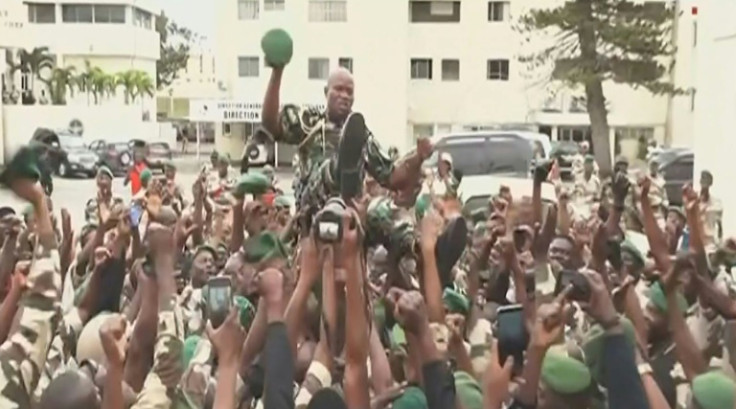Into The Spotlight: Gabon's New Strongman

General Brice Oligui Nguema, who was sworn in as Gabon's new interim president on Monday, was unknown to much of the public before he led a coup last week that ended 55 years of rule by the Bongo dynasty.
Many Gabonese first saw Oligui on television when, as head of the elite Republican Guard, he was triumphantly carried aloft by his troops hours after President Ali Bongo Ondima was toppled.
Bongo's ouster came just moments after he was declared victor in a bitterly disputed election, securing a third term in office.
For years, Oligui, 48, worked in the wings under Bongo and his father Omar, the oil-rich state's iron-fisted ruler for 41 years and reputed kleptocrat.
But Oligui has dramatically shed his cloak of discretion since the turbulent events of Wednesday.
In a whirlwind few days, he met with the country's key interest groups, from religious leaders and civil groups to business leaders.
He starkly warned the business community that the "massive corruption" and "catastrophic governance" that flourished under Bongo would no longer be tolerated.
He also sought to soothe unease about the takeover among Gabon's international partners and donors, telling diplomats and foreign organisations that he had taken power "in order to avoid a bloodbath."
He put himself forward as the defender of the poor, vowing to allocate 7.2 billion CFA francs ($12 million) in assets seized from senior Bongo aides, including the president's son, to providing running water.
And he vowed to overhaul the country's pension system, whose decrepit management and bureaucracy have left many people doomed to poverty.
After taking his oath of office on Monday, Oligui promised to hold "free, transparent and credible elections" after a transition period that he did not specify, and to amnesty "prisoners of conscience."
Born to a Fang father, Gabon's main ethnic group, Oligui mostly grew up with his mother in Haut-Ogooue province, a Bongo stronghold, and rose as an aide-de-camp to the elder Bongo.
"He's someone who knows the Gabonese military apparatus very well, a good soldier, trained at good military schools" including Morocco's Meknes royal military academy, a member of Bongo's Gabonese Democratic Party (PDG) said on condition of anonymity.
A former close colleague told AFP that Oligui was extremely close to Bongo senior, serving him from 2005 until his death in a Barcelona hospital.
But Oligui was moved aside in 2009 after Ali Bongo was elected to succeed his father, beginning a 10-year stint as a military attache at Gabon's embassies in Morocco and Senegal.
He returned to prominence in 2018 as the Republican Guard's intelligence chief, replacing Bongo's half-brother Frederic Bongo, before getting promoted to general six months later.
The bald and athletically built general has been chief of the republican guard, the country's most powerful army unit, since 2019, with close sources describing him as charismatic and respected.
As the keystone of Gabon's security forces, Oligui pushed Bongo junior to improve his men's working and living conditions by upgrading their facilities, funding schools for soldiers' children and refurbishing some accommodation.
The measures earned him respect and sympathy from his colleagues, according to the PDG source.
"He isn't very talkative, but very appreciated by his men. He's a Julius Caesar, and Julius Caesar cares for the comfort of his legionaries," the source said, referring to the Roman general who went on to take power.
The former colleague praised "a man of consensus, who never raises his voice, who listens to everyone and systematically seeks compromise."
An example of his unifying approach was including officers from all army branches in the new ruling Committee for the Transition and Restoration of Institutions, helping to stage the coup without any reported bloodshed.
© Copyright AFP 2024. All rights reserved.





















